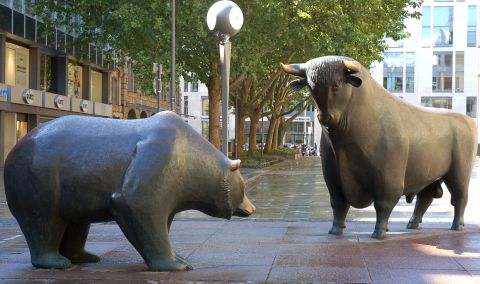Podcast: Play in new window | Download
Subscribe: RSS

It’s bulls v. bears on Wall Street, and the collateral damage is substantial.
Overtaken by arithmetic and logic, the Wall Street bulls are trying to find a place to hide their money, and while they don’t agree on where to put it, they are beginning to agree that it definitely should not be in the fracking patch. The stock of fracking operators has been in bear country for weeks now as the strain of trying to pretend everything is all right gets worse by the hour.
A Ponzi scheme requires the operator to get new suckers in the door fast enough to use their money to pay off the old suckers, so they don’t blow the whistle on the con. A fracking scheme requires the operator to get new “investors” in the door fast enough to a) roll over the old debt, and b) build new wells fast enough to mask the incredibly fast decline rates of fracking wells.
After five years of pretending we are in the vanguard of a new oil bonanza in America, all the operators are swamped with debt; their bonds are classified as junk and their stock isn’t looking much better — it’s leading the market down at the moment.
According to Business Insider: Over the previous quarter, some of the notable losers include Nabors, down 42%, Seadrill, down 40%, Whiting Petroleum, down 33%, Transocean, down 33%, Concho Resources, down 34%, and Helmerlich & Payne, down 32%.
It’s interesting that you and I have never heard of these companies, for all that they are supposed to be leading us into the dawning of a new Age of Petroleus. Also interesting that Chesapeake Energy, which we’ve kind of heard about in that it is the second largest player in the patch, has just announced that it is selling $5 billion worth of its shale leases in the Marcellus play in West Virginia and the Utica Shale in Pennsylvania. Previously the company had sold $3 billion worth of leases, rigs, buildings and used cars — okay, I made that last one up — in order to stay afloat.
The problem of how to stay in business without really making a profit is not limited to the fracking patch. Big Oil has been contracting since long before the bottom fell out of crude prices: according to Morgan Stanley, the Seven Sisters (as the world’s largest oil companies used to be called) last year ran a collective deficit of $55 billion. To be sure they had profits, but spent more than they made in dividends (keeping investors happy) and prospecting for new oil. To keep money in the till they have sold $150 billion worth of assets in the past four years, and have promised restive investors (see Ponzi Scheme, above) to cut exploration and operating expenses.
With all oil harder to find and more expensive to extract, cutting those expenses is like cutting of your nose because you don’t like the look of your face.
The bulls are running in circles at the moment, deeply frightened and looking for a place to stash cash. If they don’t find a place they may stay where they are for a while, snorting and pawing, but God help the markets if they all decide that Peruvian orchid futures are where it’s at. Meanwhile, while they’re thinking about it, they are stomping the life out of the fracking industry.
I work at a municipal utility and we had a speaker at an annual meeting just last night (the speaker was from a major energy trading corp) who spoke glowingly of how this nation will be awash in cheap oil and NG for decades to come. When I asked about the current marginal cost of NG production from fracking operations, he said ~$2 (which I have a hard time matching up to the reports of lease sales, as mentioned above). The cornucopian cheerleading is beginning to become quite shrill.
Once again we bear witness to our place on the exponential curve (of decline or chaos) – ever steepening (or falling/depending on what we’re measuring) – and it feels like the moment just before the rollercoaster crests the peak, that it’s all going to be downhill from here.
Everyone is so happy about the cheap gas that nobody wants to question the inevitable consequences of any finite supply or understands Jevon’s Paradox.
Politicians are the worst because they’re playing both sides.